.45 S&W, 7" barrel, S/N 8945. Nickel finish, ivory grips. Standard address and patent markings throughout. Matching serial numbers on frame and cylinder. Backstrap engraved Presented to Brevet Captain Robert G. Carter upon his retirement July 6, 1876. Robert G. Carter was born in Maine in 1845 and moved to Massachusetts with his family in 1857. With the outbreak of the Civil War he volunteered to fight for the Union and served as a private in the 22nd Massachusetts Volunteer Infantry where he was engaged in most of the major campaigns of the Army of the Potomac including Antietam, Gettysburg, The Wilderness and the Siege of Petersburg. Following the war he attended West Point, entering in 1865 after graduation he was commissioned as a second lieutenant assigned to the 4th US Cavalry in 1870. The 4th operated in Texas against the Comanches during this period and for his actions taken on October 10, 1871 he was awarded the Congressional Medal of Honor. The fighting took place in Blanco Canyon, along a tributary of the Brazos River, and the citation notes that it was awarded for Carter's "most distinguished gallantry." Carter was wounded during the battle when his leg was crushed by a falling horse, with the resultant injury eventually causing his retirement from the Army. Carter was breveted to first lieutenant for his actions that day. After recovering from his injury enough to return to service, he fought against the Kickapoo and remained in service through the end of June 1876. During this time he was officially promoted to 1st lieutenant (no longer a brevet rank) and was subsequently promoted to brevet captain prior to his retirement. He was awarded the permanent rank of captain on the retired list in 1904, some four years after officially receiving his Medal of Honor. After retiring from the army he worked as as teacher and author, publishing several short books and a memoir of his frontier service along the Mexican border. Carter died in 1936. Revolver is accompanied by a Smith & Wesson "Factory Letter" that confirms that it left the factory with a nickel finish and was shipped to M.W. Robinson, Smith & Wesson's oldest distributor, located in New York City. Provenance:Factory Letter Condition: Very good. Retains most of what appears to be a period nickel finish with a slightly milky appearance, some minor loss and scattered discoloration and light oxidation. All markings remain clear and legible. Action is mechanically functional, however the cylinder pin is not retained in the frame, resulting in the ejection of the entire cylinder when the action is opened. This could probably be remedied by a competent gunsmith. Bore good with scattered pitting. Grips very good with some light wear.
.45 S&W, 7" barrel, S/N 8945. Nickel finish, ivory grips. Standard address and patent markings throughout. Matching serial numbers on frame and cylinder. Backstrap engraved Presented to Brevet Captain Robert G. Carter upon his retirement July 6, 1876. Robert G. Carter was born in Maine in 1845 and moved to Massachusetts with his family in 1857. With the outbreak of the Civil War he volunteered to fight for the Union and served as a private in the 22nd Massachusetts Volunteer Infantry where he was engaged in most of the major campaigns of the Army of the Potomac including Antietam, Gettysburg, The Wilderness and the Siege of Petersburg. Following the war he attended West Point, entering in 1865 after graduation he was commissioned as a second lieutenant assigned to the 4th US Cavalry in 1870. The 4th operated in Texas against the Comanches during this period and for his actions taken on October 10, 1871 he was awarded the Congressional Medal of Honor. The fighting took place in Blanco Canyon, along a tributary of the Brazos River, and the citation notes that it was awarded for Carter's "most distinguished gallantry." Carter was wounded during the battle when his leg was crushed by a falling horse, with the resultant injury eventually causing his retirement from the Army. Carter was breveted to first lieutenant for his actions that day. After recovering from his injury enough to return to service, he fought against the Kickapoo and remained in service through the end of June 1876. During this time he was officially promoted to 1st lieutenant (no longer a brevet rank) and was subsequently promoted to brevet captain prior to his retirement. He was awarded the permanent rank of captain on the retired list in 1904, some four years after officially receiving his Medal of Honor. After retiring from the army he worked as as teacher and author, publishing several short books and a memoir of his frontier service along the Mexican border. Carter died in 1936. Revolver is accompanied by a Smith & Wesson "Factory Letter" that confirms that it left the factory with a nickel finish and was shipped to M.W. Robinson, Smith & Wesson's oldest distributor, located in New York City. Provenance:Factory Letter Condition: Very good. Retains most of what appears to be a period nickel finish with a slightly milky appearance, some minor loss and scattered discoloration and light oxidation. All markings remain clear and legible. Action is mechanically functional, however the cylinder pin is not retained in the frame, resulting in the ejection of the entire cylinder when the action is opened. This could probably be remedied by a competent gunsmith. Bore good with scattered pitting. Grips very good with some light wear.
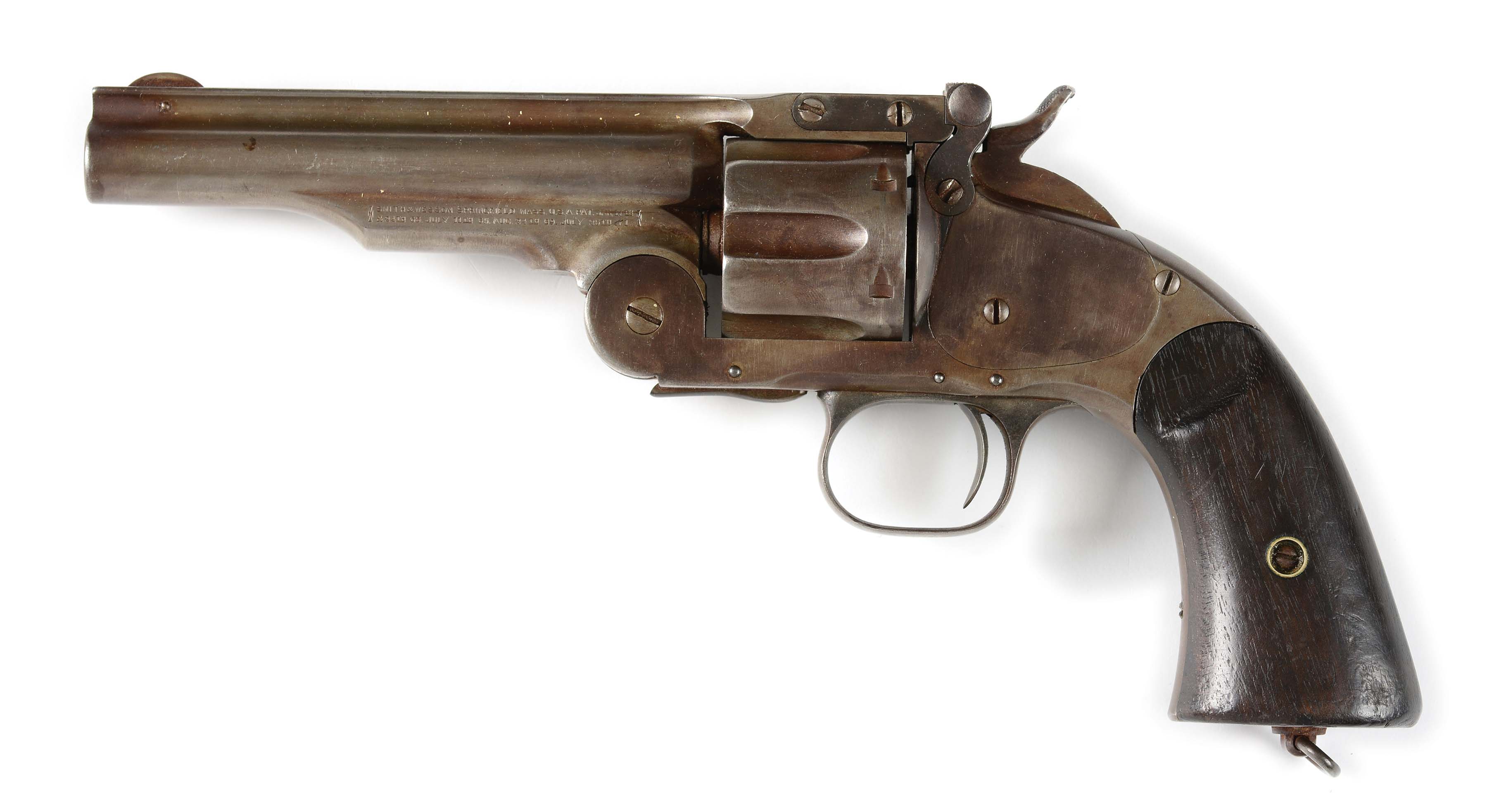






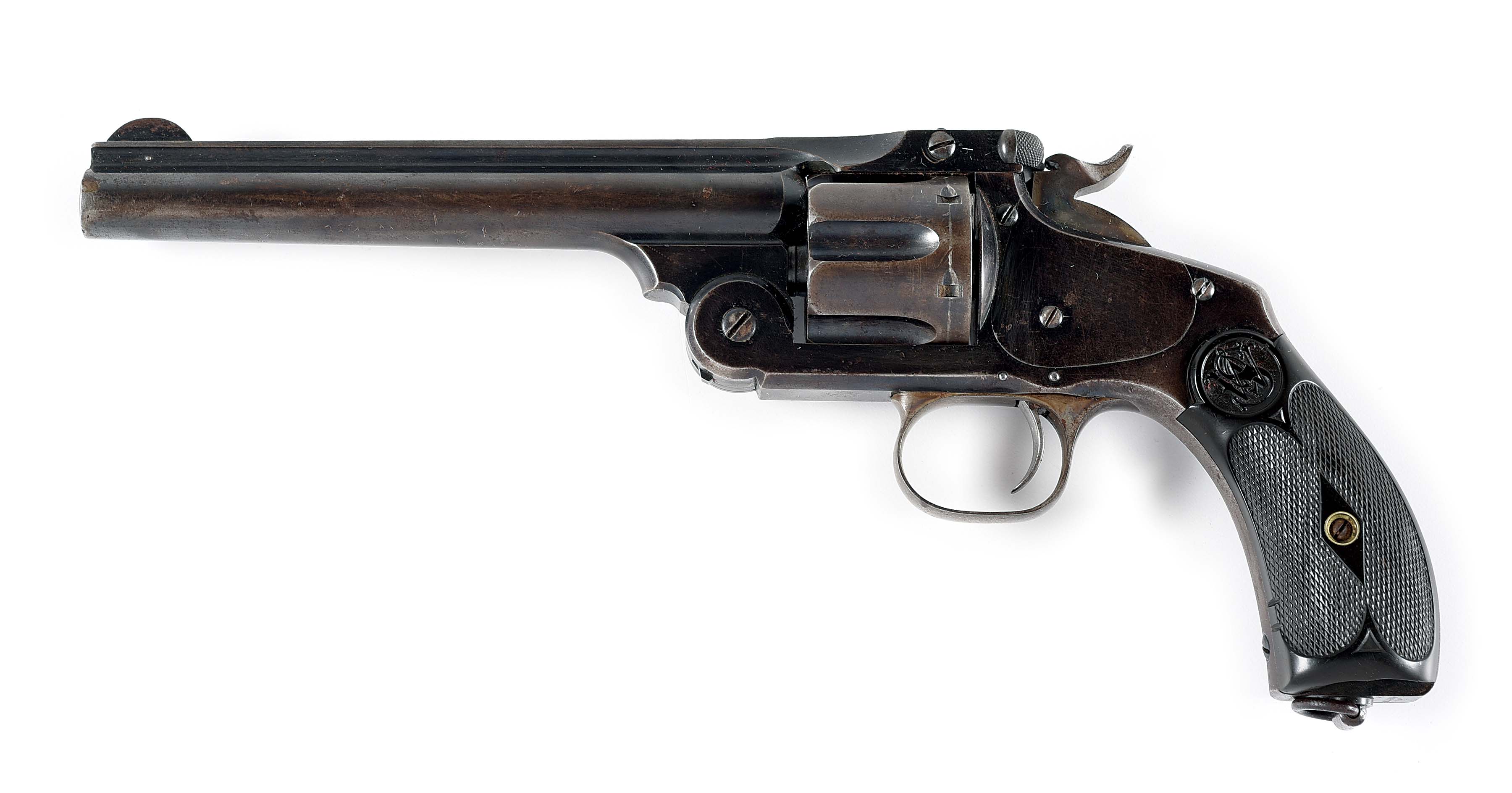
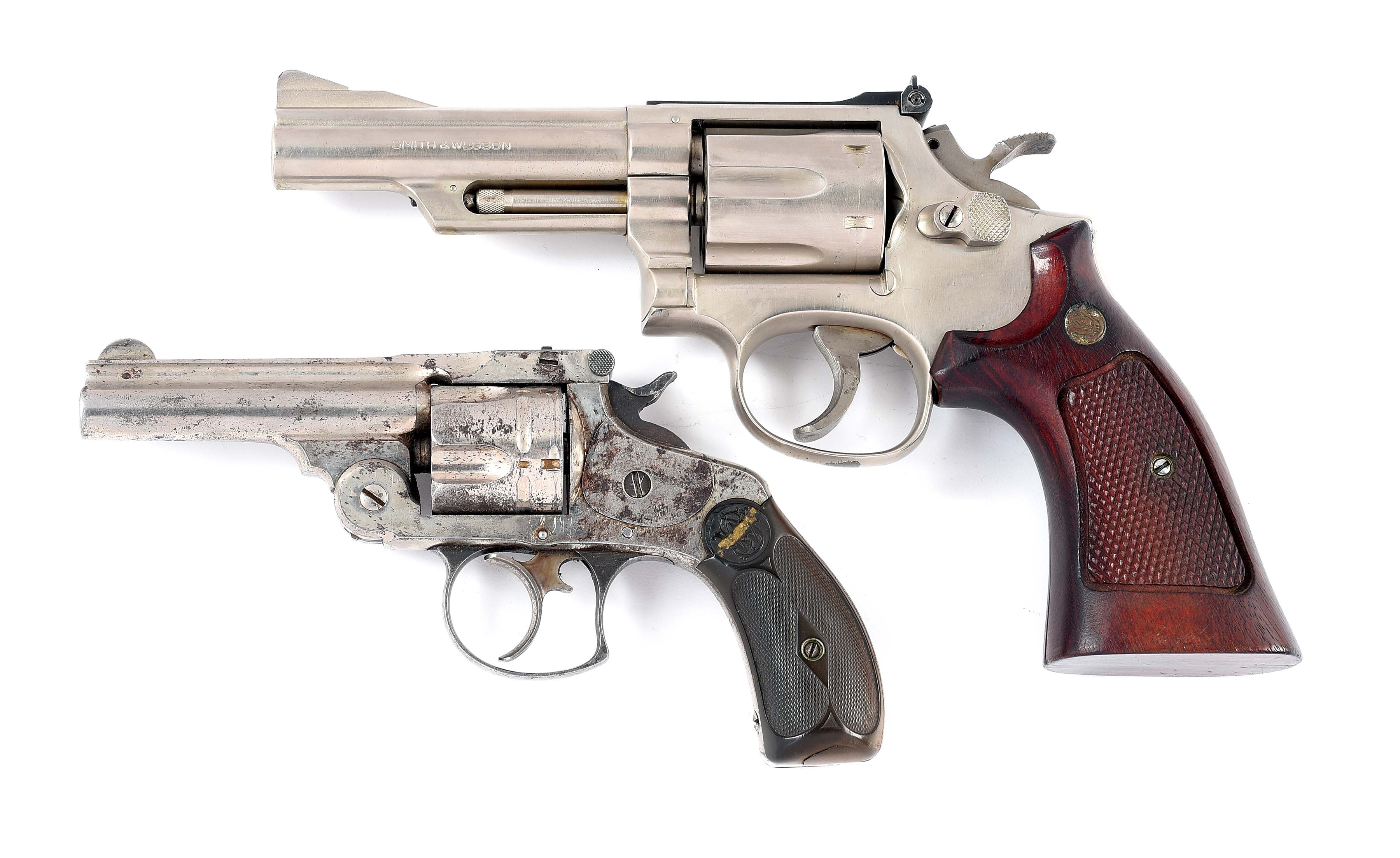
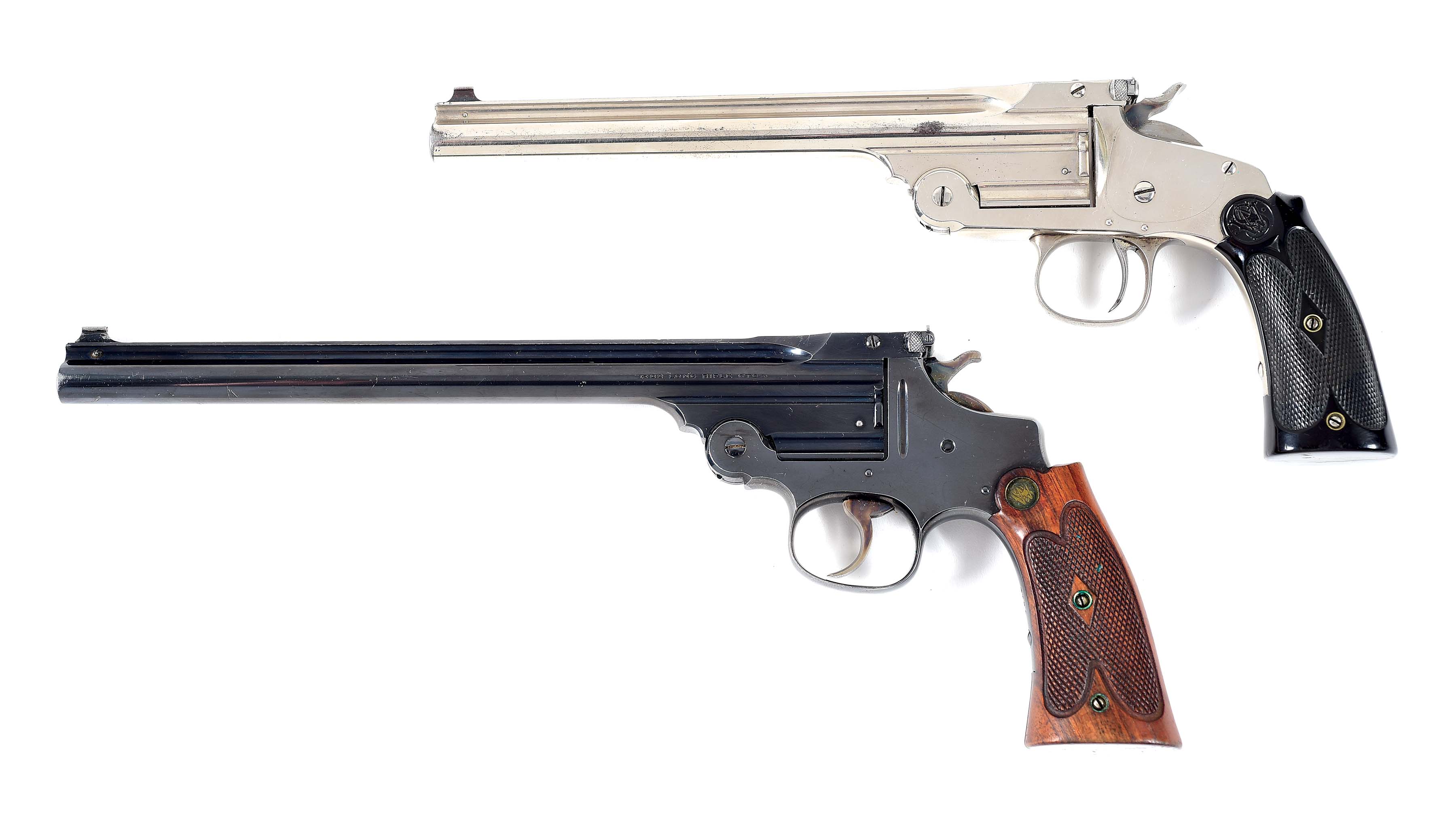


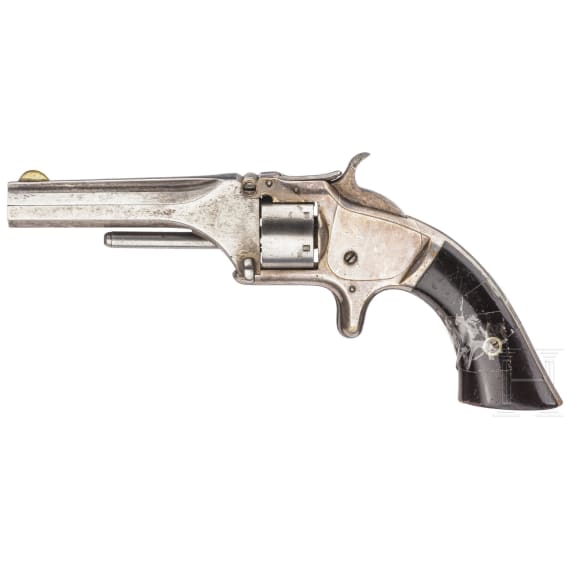


Testen Sie LotSearch und seine Premium-Features 7 Tage - ohne Kosten!
Lassen Sie sich automatisch über neue Objekte in kommenden Auktionen benachrichtigen.
Suchauftrag anlegen